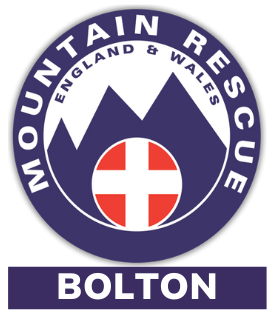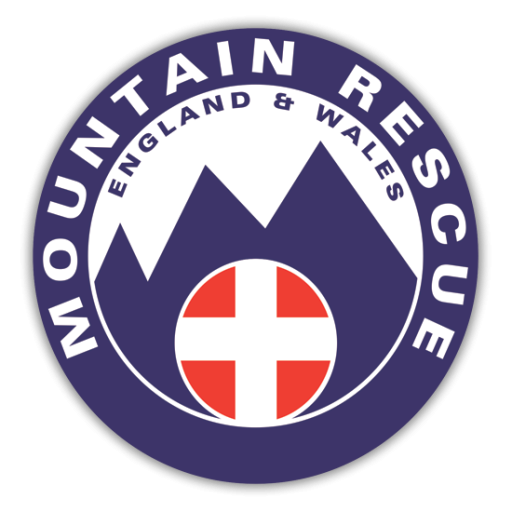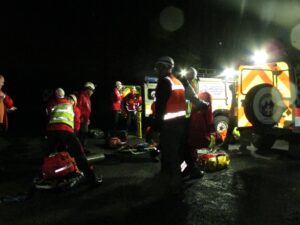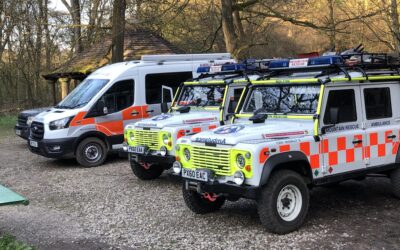At 22:00 this evening the team were contacted by the North West Ambulance Service to assist in the evacuation of two casualties who had fallen approximately 10 metres into a steep sided gully.
The alarm was raised by a friend who was able to guide the responding ambulance crew to the casualties location.
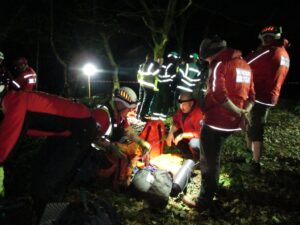 Recognising additional help would be required, the Ambulance crew requested our assistance together with Lancashire Fire Service and the HART team. The NPAS police helicopter tried to provide scene lighting, but due to the tree cover, this was not successful.
Recognising additional help would be required, the Ambulance crew requested our assistance together with Lancashire Fire Service and the HART team. The NPAS police helicopter tried to provide scene lighting, but due to the tree cover, this was not successful.
The first mountain rescue personnel on scene was able to provide a grid reference for the site, and due to his local knowledge, was able to direct the responding mountain rescue and HART crews to the bottom of the gully to allow them to walk the length of the gully to the casualties. Due to the difficulties of walking in a slippery, uneven river bed, an alternate extraction plan was required, so a rope haul system was devised.
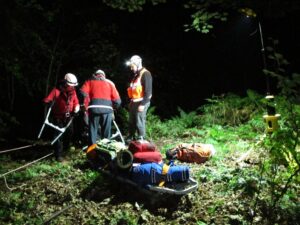 Bolton Mountain Rescue have adopted the Fire Services Rope Access procedures, so the system set up was familiar to all rope technicians, some of the rescuers had also recently attended the Lyon Rope Access course, so were well versed in the use of iDs.
Bolton Mountain Rescue have adopted the Fire Services Rope Access procedures, so the system set up was familiar to all rope technicians, some of the rescuers had also recently attended the Lyon Rope Access course, so were well versed in the use of iDs.
Two casualties were stuck in the bottom of the gully, so two sets of kit were required, two stretchers, two vacuum mattresses, two casualty bags, two scoops, all the lighting available…
The first casualty was “walking wounded”, so once he had been hauled up from the base of the gully, he was able to walk assisted where he could be checked over in the warmth and dry of a waiting ambulance parked outside the Royal Public House in Tockholes.
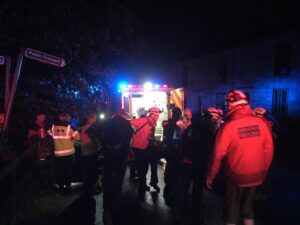 The second casualty had suffered a fractured leg, so definitely required a stretcher carry! Once the casualty had been hauled out of the gully, a plethora of fire, ambulance and mountain rescue personnel assisted in the carry to the waiting ambulance, followed by several trips to collect equipment, both team and personal equipment.
The second casualty had suffered a fractured leg, so definitely required a stretcher carry! Once the casualty had been hauled out of the gully, a plethora of fire, ambulance and mountain rescue personnel assisted in the carry to the waiting ambulance, followed by several trips to collect equipment, both team and personal equipment.
The following resources were involved in this incident:
- North West Ambulance Service – at least two land ambulances and one RRV
- North West Ambulance HART Team
- Lancashire Fire & Rescue Service – Two appliances with crews
- Lancashire Fire & Rescue Service Rope Rescue Teams
- National Police Air Service Helicopter
- Lancashire Constabulary – At least two officers
- Bolton Mountain Rescue Team – 21 team members
Bolton Mountain Rescue Team left the scene at 02:00, returning to our base location unloading wet kit to start the drying out process ready for the next day, well, same day after the incident had concluded.
This incident demonstrated the close working between all the emergency services, all working to a common cause of helping people in need.
